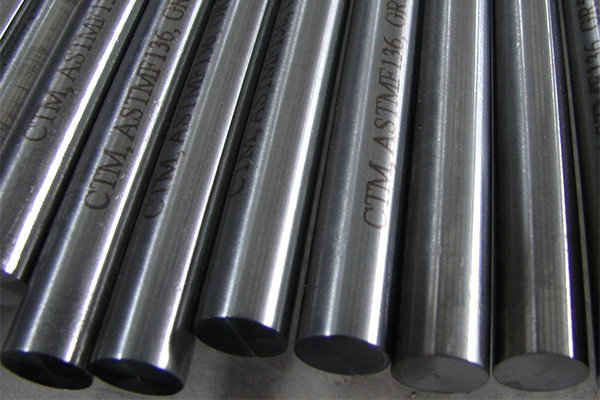Acewell: What are the ten properties of titanium? Learn more below
(1) Low density and high specific strength
The density of titanium metal is 4.51g/cubic centimeter, which is higher than aluminum but lower than steel, copper and nickel, but its specific strength ranks first among metals.
(2) Corrosion resistance
Titanium is a very active metal, its equilibrium potential is very low, and its thermodynamic corrosion tendency is large in the medium. But in fact titanium is very stable in many media, such as titanium is corrosion-resistant in oxidizing, neutral and weakly reducing media. This is because titanium has a great affinity with oxygen. In the air or in an oxygen-containing medium, a layer of dense, strong adhesion, and high inert oxide film is formed on the surface of titanium, which protects the titanium substrate from corrosion. Even due to mechanical wear, it will quickly heal or regenerate itself. This indicates that titanium is a metal with a strong tendency to passivate. The titanium oxide film always maintains this characteristic when the medium temperature is below 315°C.
In order to improve the corrosion resistance of titanium, surface treatment technologies such as oxidation, electroplating, plasma spraying, ion nitriding, ion implantation and laser treatment have been studied, which have enhanced the protective effect on the oxide film of titanium and obtained the desired corrosion resistance. Effect. A series of corrosion-resistant titanium alloys such as titanium-molybdenum, titanium-palladium and titanium-molybdenum-nickel have been developed to meet the needs of metal materials in the production of sulfuric acid, hydrochloric acid, methylamine solution, high-temperature wet chlorine gas and high-temperature chloride. Titanium-32 molybdenum alloy is used for titanium castings, titanium-0.3 molybdenum-0.8 Nickel Alloy is used for the environment where crevice corrosion or pitting corrosion often occurs, or titanium-0.2 palladium alloy is used for parts of titanium equipment, all of which have been well used Effect.
(3) Good heat resistance
The new titanium alloy can be used for a long time at a temperature of 600 ° C or higher.
(4) Good low temperature resistance
Low-temperature titanium alloys represented by titanium alloys TA7 (Ti-5Al-2.5Sn), TC4 (Ti-6Al-4V) and Ti-2.5Zr-1.5Mo, etc., the strength increases with the decrease of temperature, but the plasticity change does not change. big. It maintains good ductility and toughness at low temperatures of -196-253°C, avoids metal cold brittleness, and is an ideal material for low-temperature containers, storage tanks and other equipment.
(5) Strong anti-damping performance
Compared with steel and copper metals, when titanium metal is subjected to mechanical vibration and electrical vibration, its own vibration attenuation time is longer. This property of titanium can be used as a tuning fork, a vibrating element of an ultrasonic pulverizer in medicine, and a vibrating film of an audio speaker.
(6) Non-magnetic,
Titanium is a non-magnetic metal, it will not be magnetized in a large magnetic field, and it has good compatibility with human tissue and blood, so it is used in the medical field.
(7) The tensile strength is close to its yield strength
This property of titanium shows that its yield strength ratio (tensile strength/yield strength) is high, which means that the plastic deformation of metal titanium materials is poor during forming. Due to the large ratio of the yield limit of titanium to the elastic modulus, the resilience of titanium during molding is large.
(8) Good heat exchange performance
Although the thermal conductivity of titanium metal is lower than that of carbon steel and copper, due to the excellent corrosion resistance of titanium, the wall thickness can be greatly reduced, and the heat exchange method between the surface and steam is drop-like condensation, which reduces the heat group, and the surface is too The non-fouling can also reduce the thermal resistance, so that the heat transfer performance of titanium is significantly improved.
(9) Low elastic modulus
The modulus of elasticity of titanium is 106.4GPa at room temperature, which is 57% of that of steel.
(10) Inhalation performance
Titanium is a very reactive metal that reacts with many elements and compounds at high temperatures. Titanium getter mainly refers to the reaction with carbon, hydrogen, nitrogen and oxygen at high temperature.


